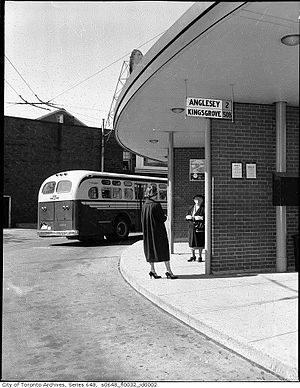Jane Loop (Toronto): Difference between revisions
George Swan (talk | contribs) (first draft here) |
George Swan (talk | contribs) (copy editing) |
||
| Line 1: | Line 1: | ||
[[File:A bus leaving the TTC's Jane loop.jpg|thumb|This photo shows a bus exiting from the outer concentric ring of the Jane loop, showing a bus bay for two bus routes.<br>City of Toronto Archives, Series 648, s0648 fl0032 id0002]] | [[File:A bus leaving the TTC's Jane loop.jpg|thumb|This photo shows a bus exiting from the outer concentric ring of the Jane loop, showing a bus bay for two bus routes.<br>City of Toronto Archives, Series 648, s0648 fl0032 id0002]] | ||
The [[Toronto Transit Commission]]'s '''Jane loop''' was an important [[Toronto streetcar loop]], prior to the completion of the [[Bloor Danforth Subway line]].<ref name=TTBloor> | The [[Toronto Transit Commission]]'s '''Jane loop''' was an important [[Toronto streetcar loop]], prior to the completion of the [[Bloor Danforth Subway line]].<ref name=TTBloor/> | ||
It was the western end of [[Bloor Streetcar line]]. | |||
The loop was at a boundary between two zones in the [[Toronto Transit Commission fares#History of zone fares|TTC's zoned fare system]]. | |||
Half a dozen or so buses and trolleybuses terminated at the loop. | |||
According to popular historian Mike Filey, the [[Bloor Streetcar line]] was extended to [[Jane Street]] on December 31, 1923.<ref name=FileyHorsepower/> | |||
==Design== | |||
By the 1960s the facility had two structures. The facility two concentric loops with a covered crescent shaped structure that protected passengers from the sun and rain as they boarded, unboarded, or waited for their vehicles. | |||
The inner loop was reserved exclusively for [[Toronto streetcars|streetcars]], which entered the inner loop in a counter-clockwise direction, so their doors opened onto the inner edge of the cresent shaped structure. Buses and trolleybuses entered the outer loop in a clockwise direction, so their doors opened onto the outer edge of the crescent shaped structure. | |||
Passengers could ask for paper transfers when they boarded the first vehicle on their route, if they planned to transfer to another vehicle in the same zone. | |||
A small structure in the center of the loops housed a ticket agent and coffee shop. | |||
The TTC owned and operated a subsidiary, [[Gray Coach]], which ran intercity buses throughout southern Ontario. Tickets for intercity Gray Couch routes could be purchased there. | |||
== References == | |||
{{reflist|refs= | |||
<ref name=TTBloor> | |||
{{cite news | {{cite news | ||
| url = http://transit.toronto.on.ca/streetcar/4115.shtml | | url = http://transit.toronto.on.ca/streetcar/4115.shtml | ||
| Line 19: | Line 37: | ||
}} | }} | ||
</ref> | </ref> | ||
<ref name=FileyHorsepower> | |||
{{cite news | {{cite news | ||
| url = http://books.google.ca/books?id=Cw6yAF4EHCAC&pg=PA74&lpg=PA74&dq=Toronto+OR+TTC+%22jane+loop%22&source=bl&ots=YQdQX7Z6uL&sig=J02SGJAedVug2Sci4f9DSiiPgbs&hl=en&sa=X&ei=wzsCU5PZOsXJqwG514HwBQ&redir_esc=y#v=onepage&q=Toronto%20OR%20TTC%20%22jane%20loop%22&f=false | | url = http://books.google.ca/books?id=Cw6yAF4EHCAC&pg=PA74&lpg=PA74&dq=Toronto+OR+TTC+%22jane+loop%22&source=bl&ots=YQdQX7Z6uL&sig=J02SGJAedVug2Sci4f9DSiiPgbs&hl=en&sa=X&ei=wzsCU5PZOsXJqwG514HwBQ&redir_esc=y#v=onepage&q=Toronto%20OR%20TTC%20%22jane%20loop%22&f=false | ||
| Line 37: | Line 52: | ||
}} | }} | ||
</ref> | </ref> | ||
}} | |||
Revision as of 11:15, 3 January 2024
The Toronto Transit Commission's Jane loop was an important Toronto streetcar loop, prior to the completion of the Bloor Danforth Subway line.[1] It was the western end of Bloor Streetcar line. The loop was at a boundary between two zones in the TTC's zoned fare system. Half a dozen or so buses and trolleybuses terminated at the loop.
According to popular historian Mike Filey, the Bloor Streetcar line was extended to Jane Street on December 31, 1923.[2]
Design
By the 1960s the facility had two structures. The facility two concentric loops with a covered crescent shaped structure that protected passengers from the sun and rain as they boarded, unboarded, or waited for their vehicles. The inner loop was reserved exclusively for streetcars, which entered the inner loop in a counter-clockwise direction, so their doors opened onto the inner edge of the cresent shaped structure. Buses and trolleybuses entered the outer loop in a clockwise direction, so their doors opened onto the outer edge of the crescent shaped structure.
Passengers could ask for paper transfers when they boarded the first vehicle on their route, if they planned to transfer to another vehicle in the same zone.
A small structure in the center of the loops housed a ticket agent and coffee shop. The TTC owned and operated a subsidiary, Gray Coach, which ran intercity buses throughout southern Ontario. Tickets for intercity Gray Couch routes could be purchased there.
References
- ↑ James Bow. The Bloor Streetcar (Deceased), Transit Toronto, 2013-07-07. Retrieved on 2014-02-17. “Starting out at Luttrell Loop at the eastern city limits of Toronto's Danforth Avenue, the Bloor Streetcar picked up passengers deposited by suburban buses stopping at the terminal. There, the car trundled west along Danforth Avenue, across the Prince Edward Viaduct and along Bloor Street to the western city limits at Jane Street. There, cars turned at Jane Loop, another terminal where passengers from west suburban buses disembarked to transfer for the journey east.”
- ↑ Mike Filey. From Horse Power to Horsepower: Toronto: 1890-1930, Dundurn Press, 1996, p. 74. Retrieved on 2014-02-17. “Over the years this route was extended westerly, first to Runnymede Road, then, two years after the TTC was formed, the new JANE loop that opened on the last day of 1923.”
